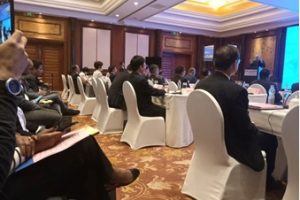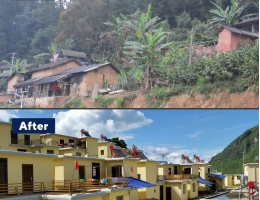It is widely recognized that China has been making significant strides and is emerging as a dominant power in the global economy. This progress can be attributed to the strong work ethic of its citizens alongside various other contributing factors. Given this context, the nation has consistently been achieving remarkable results time and time again. Currently, China appears to be on a favorable trajectory even as it encounters several challenges.
A report detailing the execution of the 2024 plan for the nation’s economic and social development, along with the proposed initiatives for 2025, indicates that in the coming year, we will adhere to the core principles established during the Central Economic Work Conference and put into action the strategies approved in this year’s sessions of the NPC and the CPPCC National Committee. The focus will be on priorities in the following ways.
We will steadily expand institutional opening up and take the initiative to open wider and advance unilateral opening up in a well-organized way. With opening up, we can stimulate reform and development at home and increase mutually beneficial cooperation with other countries.
The top-level design for high-quality Belt and Road cooperation in the golden decade will be enhanced. We will better coordinate and manage relevant cooperation program fully align our development strategies with those of other BRI participating countries, and continue to share our economic development experience with them. We will advance both major signature projects and “small and beautiful” public wellbeing projects and press ahead with the Silk Road initiatives themed on innovation, digital technology, green development, health, ice and snow, and air transportation.
We will speed up the high-quality development of the assembly centers of China-Europe freight trains and improve port infrastructure. We will host the second China-Europe Railway Express Cooperation Forum and the seventh Silk Road Maritime International Cooperation Forum. We will accelerate the integrated development of ports, shipping, and trading services under the Silk Road Maritime platform, advance the construction of the China-Saudi Arabia (Fujian) Industrial Cooperation Zone, and build up the “Silk Road in the Air” brand.
We will improve the regional opening up layout and steadily advance the planning and construction of key experimental zones for development and opening up in border regions. We will make high-quality progress in building the pilot zone for Silk Road e-commerce cooperation.
We will deepen foreign trade structural reform and provide greater policy settlement, foreign exchange, and other financial services, provide stronger support for stabilizing foreign trade. We will improve financing, account effectively leverage the fund for stimulating innovative development of trade in support in terms of import and export credit and export credit insurance, and distribution and construction of overseas warehouses, support the upgrading of their market share.
We will expand cross-border e-commerce, improve the services, in an effort to help enterprises maintain business stability and expand integrated pilot zones for cross-border e-commerce, expand the functions of overseas economic and trade cooperation zones, and promote transformation of integrated bonded areas. We will actively develop trade in services, green trade, and digital trade.
We will support integrated growth of domestic and foreign trade, harmonizing relevant standards and certifications to ensure unimpeded market channels. We will host major trade events to high standards, such as the China International Import Expo, the China Import and Export Fair, the China International Fair for Trade in Services, the Global Digital Trade Expo, and the China International Consumer Products Expo.
We will facilitate cross-border move of businesspeople and prudently conclude mutual visa exemption agreements with more countries. We will support strategic cooperation between foreign trade enterprises and shipping companies and encourage the establishment of international logistics hubs in regions where conditions allow.
This year, an initiative will be launched to stabilize foreign investment. We will release an updated 2025 Catalog of Encouraged Industries for Foreign Investment to guide more foreign investment toward advanced manufacturing, modern services, new- and high-technology, and energy conservation and environmental protection, in addition to attracting more investment to the central, western, and northeastern regions.
A new batch of foreign-funded projects will be selected as signature projects, with access to factors of production guaranteed. We will steadily open up the service sector, improve the comprehensive trials and demonstrations for wider opening up of the service sector, and further conduct trials on opening up the telecommunication, medical service, and education sectors.
We will continue with the efforts to make China a favored destination for foreign investment and create matching platforms for transnational companies and local investment.
We will continue with the strategy for upgrading pilot free trade zones, enhancing their performance and efficiency and granting them more power over reform tasks. We will improve guidance, service, regulation, and risk control regarding outbound investment, promote industrial and investment cooperation, and increase third-party market cooperation.
China will continue to play an active role in cooperation under multilateral mechanisms such as the UN, G20, APEC, BRICS, and SCO and actively participate in the reform of the WTO and the preparations for the 14th WTO Ministerial Conference.
We will continue to work for China’s entry into the Digital Economy Partnership Agreement and the Comprehensive and Progressive Agreement for Trans-Pacific Partnership, promote signing of the China-ASEAN Free Trade Area 3.0 Upgrade Protocol and the China-Gulf Cooperation Council Free Trade Agreement, and continue the negotiations or upgrade negotiations on the China-Japan-ROK Free Trade Area and on free trade agreements with Honduras, Salvador, New Zealand, and Switzerland. We will enter into framework agreements with more African countries on economic partnerships for shared development.
We will attach greater importance to ensuring both high-quality development and greater security, defuse risks step by step in the course of pursuing development, and resolutely prevent systemic risks.
Emphasizing output and production capacity, both agricultural production and ecological conservation, and both output expansion and income increase, we will endeavor to stabilize total grain acreage, adjust and optimize the crop planting structure, and increase the per unit crop yield and quality of grains.
We will continue to evaluate the fulfillment of responsibilities for arable land protection and food security, strengthen land protection and improve land quality, ensure the total area of farmland remains above the specified red line, and take strong measures to see to it that any arable land used for nonagricultural purposes is offset with land of an equivalent amount and quality. We will develop high-standard cropland and refine the mechanisms for development, verification, management, and protection.
We will continue with the programs to develop high-standard cropland and refine the mechanisms for development, increase the per-unit area yield of grain and oil crops on large tracts of land and enhance our capacity for preventing and mitigating agricultural disasters.
In order to motivate grain growers and major grain-producing areas, we will refine the policy systems supporting grain production, launch an inter-provincial areas under the coordination of the central government, and carry out programs to initiative for major grain-purchasing areas to compensate major grain-producing stimulate more efficient grain distribution in major grain-producing counties.
We will refine the grain pricing mechanism fully implement the minimum purchase price policy for rice and wheat, and work to see that the prices of grain and other major agricultural products remain at a reasonable level. We will expand the coverage of full-cost insurance and production income insurance for soybeans. We will make grain purchasing in an orderly manner, strengthen government reserves management, and enhance our grain purchasing and storage regulation capacity.
We will intensify regulation of the fertilizer market and ensure the provision of substitute soybean meal in feed production. We will carry out initiatives for agricultural supplies at stable prices. Continued efforts will be made to reduce and economical use of grain and prevention of food waste.
We will accelerate the planning and development of a new type of energy system and improve the systems for energy production, supply, storage, and sale. We will take orderly steps to implement a coal production reserve system, continue to increase coal production and supply capacity, and consolidate the basic supporting role of coal.
In moving faster to develop a new electric power system, we will accelerate the development of power sources that play a supporting and adjustable role in China’s power supply, trans-provincial and trans-regional electricity transmission routes, and projects for electricity mutual aid, continue to increase our capacity for sending electricity from western to eastern regions, and improve the main power grid architecture. We will actively develop nuclear power in a safe and orderly manner.
We will endeavor to complete the seven-year action plan for ramping up domestic oil and natural gas exploration and development, and we will speed up the construction of pipelines and natural gas storage infrastructure. We will refine the overall planning and linkage systems for the exploration, production, supply, storage, and sale of strategic mineral resources and increase cooperation on exploiting overseas mineral resources.
We will strengthen energy coordination and distribution, better leverage medium- and long-term contracts as the cornerstone in energy supply, and ensure energy supply at times of peak demand in summer and winter.
Focusing on key areas such as integrated circuits, industrial machine tools, medical equipment, instruments, basic software, industrial software, and advanced materials, we will improve the new system for mobilizing resources nationwide, develop new ways of organizing research on key technologies, harness the driving force of application scenarios, intensify R&D, and expand the application of technological advances, in order to constantly enhance the resilience and security of our industrial and supply chains.
BY ADDISALEM MULAT
THE ETHIOPIAN HERALD WEDNESDAY 12 MARCH 2025




